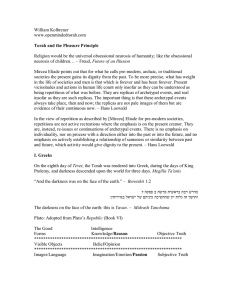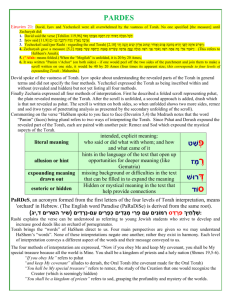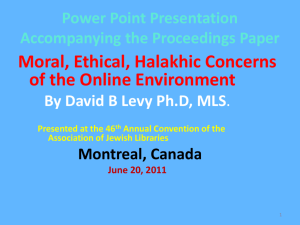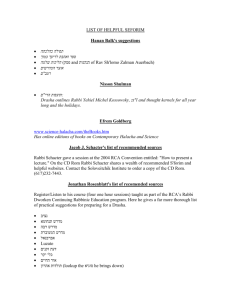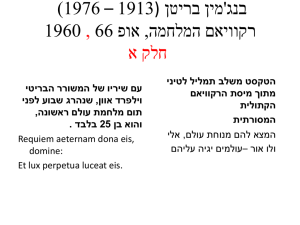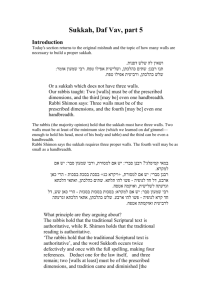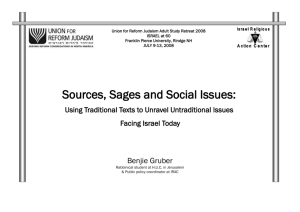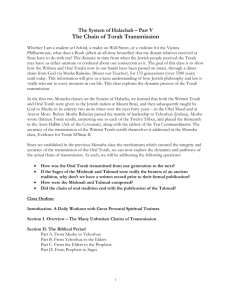Case Studies in Jewish Business Ethics
advertisement
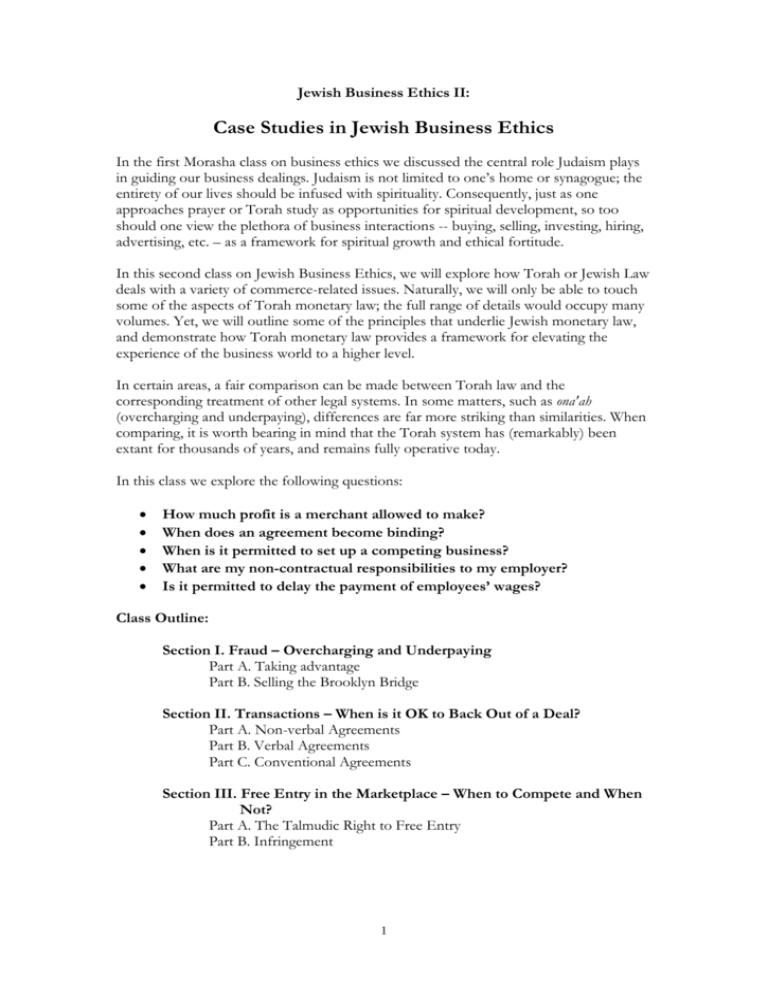
Jewish Business Ethics II: Case Studies in Jewish Business Ethics In the first Morasha class on business ethics we discussed the central role Judaism plays in guiding our business dealings. Judaism is not limited to one’s home or synagogue; the entirety of our lives should be infused with spirituality. Consequently, just as one approaches prayer or Torah study as opportunities for spiritual development, so too should one view the plethora of business interactions -- buying, selling, investing, hiring, advertising, etc. – as a framework for spiritual growth and ethical fortitude. In this second class on Jewish Business Ethics, we will explore how Torah or Jewish Law deals with a variety of commerce-related issues. Naturally, we will only be able to touch some of the aspects of Torah monetary law; the full range of details would occupy many volumes. Yet, we will outline some of the principles that underlie Jewish monetary law, and demonstrate how Torah monetary law provides a framework for elevating the experience of the business world to a higher level. In certain areas, a fair comparison can be made between Torah law and the corresponding treatment of other legal systems. In some matters, such as ona'ah (overcharging and underpaying), differences are far more striking than similarities. When comparing, it is worth bearing in mind that the Torah system has (remarkably) been extant for thousands of years, and remains fully operative today. In this class we explore the following questions: How much profit is a merchant allowed to make? When does an agreement become binding? When is it permitted to set up a competing business? What are my non-contractual responsibilities to my employer? Is it permitted to delay the payment of employees’ wages? Class Outline: Section I. Fraud – Overcharging and Underpaying Part A. Taking advantage Part B. Selling the Brooklyn Bridge Section II. Transactions – When is it OK to Back Out of a Deal? Part A. Non-verbal Agreements Part B. Verbal Agreements Part C. Conventional Agreements Section III. Free Entry in the Marketplace – When to Compete and When Not? Part A. The Talmudic Right to Free Entry Part B. Infringement 1 Section IV. Working for Hire – Whose Time is it Anyway? Part A. A Time to Work, a Time for Oneself Part B. All for the Boss Section V. Pay Day – Timely Compensation of Workers Part A. His Life Depends on It Part B. Falling Short 2 Section I. Fraud: Overcharging or Underpaying For most people, the main purpose of business is to make money, and the more the merrier. In selling goods, money is made by making a profit: selling items for more than what they cost to manufacture or purchase from a supplier. It may also entail making such items more attractive through marketing. Questions inevitably arise then as to what is a fair price and what is not. How much profit is reasonable? At what point has a retailer crossed the line between honest business and fraudulent activity? Or consider the following question: I have a standard price list, but I'm pretty liberal about giving discounts when I need to make a sale. Is this a problem? Part A. Taking Advantage 1. Vayikra (Leviticus) 25:14 – The Torah prohibits taking advantage of another person. When you buy or sell to your neighbor, do וכי תמכרו ממכר לעמיתך או קנה מיד עמיתך אל not cheat one another. :תונו איש את אחיו 2. Talmud, Bava Metziah 58b – The context of the verse tells us that it is talking about monetary fraud. "When you buy or sell to your neighbor" - הרי- וכי תמכרו ממכר לעמיתך או קנה מיד עמיתך the verse refers to monetary fraud. .אונאת ממון אמור 3. Rambam, Hilchot Mechirah 12:1 -- The prohibition against ‘taking advantage’ applies to swindling one another, whether seller or buyer. It is forbidden for the buyer or seller to שנאמר,אסור למוכר או לקונה להונות את חבירו swindle another person, as it is written, או קנה מיד עמיתך,"וכי תמכרו ממכר לעמיתך “when you sell something to your fellow, or " איש את אחיו,אל תונו buy something from your fellow, do not take advantage of one another.” How much is considered an overcharge? How are we supposed to measure it? 4. Mishnah, Bava Metziah 4:3 – The percentage considered overcharge is 1/6, or 16%. Fraud is constituted by [an overcharge of] ,האונאה ארבעה כסף מעשרים וארבעה כסף לסלע four silver coins in twenty four, [hence] a .שתות למקח sixth of the purchase. It should be noted, however, that the base price from which to measure the overcharge is not based on the absolute value of the product. Rather, it is measured based on the going retail market value. That means that the Torah does not place limits on the amount of profit that can be made on any particular product, only that a merchant should not charge too much more than whatever the going rate happens to be. 3 Part B. Selling the Brooklyn Bridge Even when conforming to the market value, a merchant must not pretend that his goods are better than they really are (as ruled by the Shulchan Aruch, Choshen Mishpat 229). 1. Mesilat Yesharim, Chapter 11 – One may demonstrate the good qualities of his merchandise but not cover up its defects. Anything that one does in order to כל מה שהוא להראות את הקונים אמיתת טוב demonstrate the good quality of the object הנה ההשתדלות ההוא טוב וישר; אך,החפץ ויפיו is good and appropriate. However, what אינו אלא הונאה,מה שהוא לכסות מומי חפצו someone does to conceal the defects of . וזה כלל גדול באמונת המשא ומתן.ואסור what he is trying to sell constitutes trickery and is forbidden. This is an important general rule in business ethics. 2. Rabbi Shaul Wagschal, Torah Guide for the Businessman, pg. 3 – A merchant should follow a sales integrity checklist. A person can gauge what is considered misleading by asking himself the following questions before offering goods for sale: 1) Am I trying to hide anything from the buyer, such as any hidden faults? 2) Is the price correct? 3) Does the quality of the goods match up to their description? Suppose someone offers to sell you goods for what you realize is a giveaway price. Are you obligated to let the seller know the true value of the items so as to avoid transgressing the prohibition against underpaying? Or perhaps that prohibition only applies when you initiated the deal by offering a low price? 3. Rabbi Yechiel Michel Epstein, Aruch HaShulchan, Choshen Mishpat 227:1 Alerting the seller or buyer to the real price is mandatory. If the seller doesn’t know the real price and כשהמוכר אינו בקי והלוקח יודע שבטעות the buyer realizes that he is unintentionally וחסרון ידיעה מוכר לו בפחות מהמקח הקבוע being offered an unreasonably low price, he .צריך להגיד לו ואם לאו עובר בלאו must alert the seller, otherwise he transgresses a negative commandment. What if the seller says, "Other stores sell this object for ten dollars, but I won't sell it for less than 20," is there fraud here or not? Likewise, if a customer tells the seller, "Other stores are selling this item for ten dollars but I'm only willing to give you five," is this illegal underpaying, or does transparency make it OK? 4. Shulchan Aruch, Choshen Mishpat 227:27 – As long as one is transparent, he may ask whatever price he wants. Someone who deals honestly is not subject , כיצד. אין לו עליו אונאה,הנושא ונותן באמונה to the prohibition of fraud. For example, ,חפץ זה בכך וכך לקחתיו כך וכך אני משתכר בו [if the seller says] "I bought this object for .אין לו עליו אונאה such and such an amount and such and such an amount is my profit," he is not guilty of fraud. 4 Since the prohibition is contingent on the buyer's reasonable expectations, and can be waived, we see that the main emphasis is on transparency. We may now appreciate the answer to our original query: In [the case of offering selected discounts], there is no problem if you generally charge a particular price but once in a while you show flexibility for someone who is needy or particularly stubborn, etc. The average customer is justified in believing that he is paying the going price. Assuming the law allows it, you can also decide to give discounts to a particular class of customers: local residents, college students, soldiers, etc. If you publicize these discounts, then anyone who frequents your place of business knows the score. The problem is if the exception becomes the rule and you make so many “discounts” that the list price is only for the naive. I was once in a clothing store with a prominent sign saying that all prices are non-negotiable. The sign should have made me suspicious, because typically, stores with non-negotiable prices don't have signs like that. Anyway, it turned out that even without any negotiation on my part the salesman offered me "discounts" on everything I bought – discounts that still left the prices a bit above what was accepted in other stores. Anyone who paid the label price would have been ripped off not only relative to other stores, but even in relation to what other customers were paying in the same store. So it is okay for you to offer an occasional discount to make a sale, but you should try to make sure that they remain truly occasional (because when the discount becomes the rule, the buyer who pays full price is being overcharged). (Rabbi Dr. Asher Meir, The Jewish Ethicist from www.aish.com) Key Themes of Section I: The Torah tells us that we are not allowed take advantage of people monetarily by either charging too much or paying too little. The benchmark for determining the value of any particular item is the current market value. Hence, there is theoretically no limit on the amount of profit a merchant is allowed to make. Even charging too much or paying too little is permissible as long as it is not done deceitfully. If the deal is conducted candidly, with transparency, then it is fair no matter what the price. Part B. Transactions: When is it OK to Back Out of a Deal? Business is based on trust. Agreements are made and we expect our partners, clients, or sellers to stick to their word. But how much is this actually binding? Is it ever permissible to back out of a deal? Consider the following scenario: I'm selling my car on eBay. A potential buyer offered me cash outside of eBay, which would cut out eBay's fee of nearly $200. I would basically break even on this transaction…but I think it would dishonor the agreement with eBay. What do you think is the right thing to do in this case? 5 Part A. Non-verbal Agreements Jewish Law tells us to honor our agreements, even when they are NOT legally binding, as the following sources demonstrate: 1. Tehillim 15:1-2 – The righteous speak truth ‘in their heart.’ A song of David; O Lord, who will sojourn מזמור לדוד יקוק מי יגור באהלך מי ישכן בהר in Your tent, who will dwell upon Your :הולך תמים ופעל צדק ודבר אמת בלבבו:קדשך holy mount? He who walks uprightly and works righteousness, and speaks truth in his heart. What does it mean to speak truth "in his heart?" The Talmud makes it clear that the heart here is meant as a metaphor for thought. As such, the verse is telling us to remain true even to things we only mentally agree upon. 2. Makkot 24a – One should honor even commitments that were not verbalized! “and speaks truth in his heart” -- This refers . כגון רב ספרא- ודובר אמת בלבבו to Rabbi Safra. Rashi: This is what happened with Rabbi Safra. He had a certain object for sale. Someone came to him to purchase it, and Rabbi Safra happened to be in the middle of reciting Shema. The man made an offer, to which Rabbi Safra did not respond (because he could not interrupt his recitation). The buyer thought his offer must have been too low, and he therefore raised his bid. When Rabbi Safra finished, he said, “Pay what you had offered originally, for I had decided to sell it to you for that price.” רש"י—והכי הוה עובדא דרב ספרא היה לו חפץ אחד למכור ובא אדם אחד לפניו בשעה שהיה קורא ק"ש ואמר לו תן לי החפץ בכך וכך דמים ולא ענהו מפני שהיה קורא ק"ש כסבור זה שלא היה רוצה ליתנו בדמים הללו והוסיף אמר תנהו לי בכך יותר לאחר שסיים ק"ש אמר לו טול החפץ בדמים שאמרת בראשונה שבאותן דמים היה דעתי .ליתנם לך The Talmud does not mean to imply that Rabbi Safra’s mental agreement was legally binding; it was not. Nevertheless, his actions are to be praised and aspired to as he was a man of the utmost truth. This attitude to the integrity of our words and even our thoughts has been enshrined in Jewish law. Part B. Verbal Agreements 1. Mishnah, Bava Metziah 4:2 – The court curses one who backs out of a nonbinding verbal agreement. If A drew into his possession B's produce אינו יכול- משך הימנו פירות ולא נתן לו מעות without paying him the money, he cannot - נתן לו מעות ולא משך הימנו פירות,לחזור בו retract. If he paid him the money but did מי שפרע מאנשי דור: אבל אמרו.יכול לחזור בו not draw into his possession his produce, המבול ומדור הפלגה הוא עתיד להפרע ממי שאינו he can withdraw. But [the Sages] said: He .עומד בדבורו who punished the generation of the flood and the generation of the dispersion, will take vengeance from whoever does not stand by his word. 6 The 'curse' that the Sages apply to somebody who backs out of a deal is only stated with regard to a purchase that has already been paid for by the buyer. However, even when no such purchase has been made, the Sages advise parties not to back out of agreements. 2. Shulchan Aruch, Choshen Mishpat 204:7 – Words alone are not legally binding, but one should keep one’s word in any respect. If one conducted a transaction verbally, it is הנושא ונותן בדברים בלבד הרי זה ראוי לו לעמוד appropriate for him to keep his word even בדיבורו אע"פ שלא לקח מהדמים כלום ולא רשם though he neither took any money nor ... הרי זה ממחוסרי אמנה...וכל החוזר בו wrote anything down … and anyone who backs out of such a deal is considered lacking in integrity… 3. Remah, Shulchan Aruch, Choshen Mishpat 204:11 op. cit. – This law applies even when one finds a better deal. The correct opinion is that even if someone וי"א דאפילו בתרי תרעי אסור לחזור בו ואם חזר agreed to one price, and is then offered .יש בו משום מחוסרי אמנה וכן עיקר another, he should not back out of the original deal, and if he does he is considered lacking in integrity. 4. Rabbi Shaul Wagschal, Torah Guide For the Businessman, pg. 11 – One should keep one’s word even at the cost of financial loss. A verbal agreement is not legally binding according to Torah law. However, breaking a verbal agreement is considered a breach of trust. A promise to buy or sell should be upheld even if it will cause financial loss. Part C. Conventional Agreements As noted above, verbal agreement and even the transfer of moneys do not effect binding agreements in Jewish Law. But what if such a transaction is considered binding by the business community? Can one rely on Jewish law to be 'flexible' or is the general practice also binding even according to Jewish law as well? 1. Shulchan Aruch, Choshen Mishpat 201:1-2- Actions commonly used to finalize a deal carry Halachic weight as well. If one strikes a deal verbally to make a sale, מכר לו בדברים בלבד ופסקו הדמים ורשם הלוקח and the price is agreed between them, and אם מנהג המדינה הוא שיקנה...רושם על המקח the prospective buyer signs his initials upon הרושם קנין גמור נקנה המקח ואין אחד מהם יכול the item … if the accepted practice in that וכן כל דבר.לחזור בו וחייב זה ליתן הדמים region is that by writing initials one acquires תקיעת כף וכן כל...שנהגו התגרים לקנות בו כגון the object, then the item has been acquired .כיוצא בו and neither one of them can back out of the deal. This is true of any act which is accepted by merchants as binding, such as a handshake, etc. 7 Based on the above, we can formulate the answer to our initial question as follows: Although Halachah sets down specific criteria for determining whether an act is binding as a method of finalizing a transaction, anything that is accepted as final by the general public is accepted as final by the Halachah as well. It stands to reason, then, that the agreement to pay commission made with eBay is binding and should not be sidestepped. Key Themes of Section II: Even agreements that are not binding according to Jewish laws should be kept. This is a matter of personal integrity and honesty. Backing out of a deal, even a non-binding one, is so serious an infraction that Sages warned that such a person, under certain circumstances, would be accountable to God Himself. Conventional methods of formalizing agreements are recognized as binding in Jewish law as well. Section III. Free Entry in the Marketplace: When to Compete and When Not? In the spirit of competition, many economists today concern themselves with the value of free entry into the marketplace, and with the legal conditions that facilitate new production and sales in current markets. The problem, however, is that the freedom to compete often has collateral damage, as the following question highlights: Is it permitted to open a business in a neighborhood that already has a similar store, if by doing so a loss of revenue will be caused to the owner of the original store? Part A. The Talmudic Right of Free Entry 1. Talmud, Bava Batra 21b – The Talmud debated whether or not it is permissible to initiate competitive business practices. Rav Hunah said: If a resident of an alley ואתא, האי בר מבואה דאוקי ריחיא:אמר רב הונא sets up a hand mill and another resident of דינא הוא דמעכב,בר מבואה חבריה וקמוקי גביה the alley wants to set up one next to him, ... קא פסקת ליה לחיותי: דא"ל,עילויה the first has the right to stop him, because he can say to him, "You are interfering with my livelihood…" Said Rabina to Raba: Does this mean that רב הונא דאמר כרבי, לימא:א"ל רבינא לרבא Rav Hunah adopts the same principle as לא יחלק חנוני: רבי יהודה אומר,יהודה; דתנן Rabbi Yehudah (i.e., a minority opinion)? , מפני שמרגילן אצלו,קליות ואגוזין לתינוקות For we have learnt: Rabbi Yehudah says !וחכמים מתירין that a shopkeeper should not give presents of parched corn and nuts to children, because he thus entices them to come back to him. The Sages, however, allow this (so how then could he argue with the majority view)! Actually he may very well be in agreement עד כאן לא פליגי רבנן עליה דרבי,אפי' תימא רבנן with the Rabbis, for the ground on which 8 the Rabbis allowed the shopkeeper to do אנא קמפלגינא: אלא דאמר ליה- יהודה התם this was because he can say to his rival, אבל הכא אפילו רבנן, את פלוג שיוסקי,אמגוזי "Just as I make presents of nuts, so you . קא פסקת ליה לחיותי: דא"ל,מודו can make presents of almonds," but in this case perhaps the Rabbis would agree that the first man can say to the other. "You are interfering with my livelihood." All that can be determined from the Talmud at this point is that two existing businesses have the right to use advertising gimmicks to try to attract customers. What is not yet clear is the permissibility of setting up shop in competition with a pre-existing business. The Talmudic discussion continues: 2. Ibid. The debate continues. An objection was raised [against Rav , עושה אדם חנות בצד חנותו של חבירו:מיתיבי Hunah's ruling from the following source:] ואינו יכול למחות,ומרחץ בצד מרחצו של חבירו ‘A man may open a shop next to another אתה עושה בתוך שלך: מפני שיכול לומר לו,בידו man's shop or a bathhouse next to another !ואני עושה בתוך שלי man's bathhouse, and the latter cannot object because he can say to him, "You do what you like in your property and I’ll do what I like in mine!" Which claim wins: that of the incumbent businessman -- that his livelihood is being infringed upon, or that of his would-be competitor -- that he has a right to use his property in whichever way he pleases? The Talmudic debate ends unresolved, but only as concerns residents of the same shared alleyway. All sides agree, however, that in general one is permitted to open a competing business in the same city as an existing one (provided that at least one such business pays taxes in that city). Based on the Talmudic discussion above, the consensus of the classical commentators is that in most cases it is actually legal to open a competing business. Such is enshrined in Jewish law: 3. Shulchan Aruch, Choshen Mishpat 156:5 – Starting a competing business is permissible to those from the same city. If there is a practitioner of some או שהיה...היה שם במבוי אחד מבני מבוי אומן profession in one alleyway … or a store … ובא חבירו ועשה אחרת כנגדו אינו... חנות...שם and another person comes and wishes to ואפילו היה...יכול למנעו ולומר לו אתה פוסק לחיי set up shop there selling the same items he .מבני מבוי אחר אינם יכולים למנעו may do so; the first storeowner cannot stand in his way by claiming, "you are depriving me of a livelihood." This applies even if the second person comes from a different alleyway in the same city. 9 The reasoning behind this right to free entry is as follows: 4. Yad Rama to Bava Batra 21b – We need to be as concerned about other people’s prospects for livelihood as our own; additionally, we must recognize that regardless of our efforts, all that we will earn is decreed from Above. "He can say to him, 'You do what you like שהוא יכול לומר לו אתה עושה בתוך שלך ואני in your property and I’ll do what I like in ומ"ש דחישת לחיותא דידך ולא,עושה בתוך שלי mine,' " i.e., why are you only concerned ?חישת לחיותא דידי about your own livelihood and not about mine? Alternatively, since each of them is אי נמי כיון דכל חד מינן לא עביד אלא בדנפשיה כל working only for himself, each one only חד וחד מאי דפסקו ליה משמיא הוא דמטי ליה דלא deserves that which has been apportioned .מפסיק חד מינן לחיותא דחבריה him for his livelihood from Heaven and neither is really infringing on the other. Are businessmen from other cities allowed to compete for customers in “our” city? 5. Rema, Shulchan Aruch, Choshen Mishpat 156:5 – Businessmen from other cities may compete in neighborhoods in “our” city where there are not similar businesses and they pay taxes to the city. Local merchants may prevent the entrance , אין לו רשות ליכנס למבוי שיש שם בני אומנתו... of businessman from other cities from דבעל האומנות יכול לעכב עליו שלא ליכנס למבוי establishing businesses in “our” immediate אבל במבוי אחר אינו. הואיל והוא מעיר אחרת,שלו neighborhood if they directly compete . הואיל ונותן מס,יכול למחות בו with the local merchants. However, the outside businessmen may set up shop in a different neighborhood where they do not compete with local merchants as long as they pay taxes to the city. Part B. Infringement As we have seen, Jewish law recognizes the right of free entry in many instances. In the interest of fair play everyone is allowed to seek his livelihood however he sees fit. Nevertheless, it is still better to avoid infringement upon another person’s livelihood. Competition is allowed, but not for the sake of competition alone. As such, the Talmud has strong words for those who purposely infringe upon the livelihood of others. 1. Makkot 24a – Infringing upon someone else's livelihood is considered an act of wickedness. A song of David; O Lord, who will sojourn לא רגל על לשונו לא עשה לרעהו רעה וחרפה לא in Your tent, who will dwell upon Your :נשא על קרבו holy mount? … He who did not slander with his tongue, who did his neighbor no harm… (Tehillim 15:1-3) "Who did his neighbor no harm" – this refers to one who does not infringe upon the livelihood of his friend. . שלא ירד לאומנות חבירו- לא עשה לרעהו רעה 10 The logical conclusion from this discussion is that while Judaism allows for competition, there are limits placed upon the right of free entry when the collateral damage is too high. Basically, Jewish law draws the line when the competition will not merely decrease the incumbent merchant’s business but rather will effectively destroy it. 2. Pitchei Teshuvah ibid. #3 – It is forbidden to completely take over someone else’s clientele. If one person has a store at the end of a cul- מבוי הסתום מג' צדדין רק בצד אחד יכנסו לו ודר de-sac, he can prevent another from setting ראובן אצל הצד הסתום ובא שמעון לדור כנגד up a store at the entrance to the cul-de-sac, הצד הפתוח שאין יכולים ליכנס אם לא ילך קודם since is it impossible for customers to reach שע"י...לפני פתח שמעון נראה דיכול לעכב עליו the original store without passing the new דיורד לאומנותו מדחהו לגמרי שא"א שיקבלו one, and he is in effect draining all of the ...שניהם customers away. How do we define loss of livelihood? 3. Rabbi Chaim Jachter, Hasagat Gevul: Economic Competition in Jewish Law from www.jlaw.com – Loss of livelihood is defined by the socioeconomic norm. Rav Moshe Feinstein (Teshuvot Igrot Moshe, Choshen Mishpat 1:38) rules … that one may not open a business if it will destroy someone else's livelihood. Rav Moshe rules that a loss of livelihood is not defined by a loss of one's home or his ability to put food on the table. Instead, he claims, taking away one's ability to afford as much as the average person in his socioeconomic class constitutes destroying his livelihood. To answer our original question, we can say as follows: It is permitted for a person to open a store across from another store even though it will be selling the same products as the first store. This applies likewise to any service provider, such as a law firm, a travel agency, etc. The owner of the store that was there first is not permitted to take any action that is not halachically permitted to try to put the newcomer out of business. A store owner is permitted to take steps to attract customers to his store, such as having sales, to offer free gifts to new customers, and to launch a major advertising campaign, even though it is clear that the new customers will come at the expense of the competing store. The reason this is permitted is because the other store owner is capable of doing the same. It is prohibited for a merchant to try to put his competition out of business by offering goods or services at prices that other merchants are unable to match without going bankrupt. (Rabbi Tzvi Shpitz, Business Halachah from www.torah.org) Key Themes of Section III: Establishing a fair competitive business is permissible depending on the extent that it might infringe on another’s income. The reason for permitting competition is that everyone has a right to pursue a livelihood and we should all be concerned about the importance of others to earn sustenance. Furthermore, competition helps us acknowledge that ultimately it is God who provides. In that sense, competition is viewed as being a positive influence. 11 Nevertheless, infringing on someone else’s livelihood to the extent that it can cause him to go out of business is prohibited. Section IV. Working for Hire -- Whose Time is it Anyway? When one is hired to perform a service for someone, his time is no longer his own but that of his employer. How far does this concept go? To what extent does an employee have to avoid non-work related activity during office hours or thereafter? This can be a very practical issue, as the following questions demonstrate: Is it permitted for an employee to go on a diet to lose weight, if the diet will cause him to be weak and will affect his job performance? Is it permitted for an employee to "moonlight" at another job if he will be too tired to effectively perform his job the next day for his regular employer? Part A. A Time to Work, a Time for Oneself Jewish law is highly concerned about 'stealing' the time of an employer by misusing it for non-work-related items. 1. Makkot 24a – One of the Talmudic Sages was the epitome of a righteous worker. A song of David; O Lord, who will sojourn מזמור לדוד יקוק מי יגור באהלך מי ישכן בהר in Your tent, who will dwell upon Your :הולך תמים ופועל צדק ודבר אמת בלבבו: קדשך holy mount? He who walks uprightly and works righteousness, and speaks truth in his heart. Works righteousness—like Aba Chilkiyah. .פועל צדק – כגון אבא חלקיהו 2. Taanit 23a-b – Aba Chilkiyah refused visitors. When there was a rain shortage the Rabbis would send messengers to Aba Chilkiyah, who would in turn pray for rain, whereupon rain would fall. Once, a pair of scholars was sent to him for this purpose…. They found him working in the fields. They greeted him, but he did not respond in kind…. Later, they asked him, "Why did you not respond appropriately when we greeted you?” He replied: "I am a hired employee, and I did not wish to squander my employer’s time." to interrupt his work even to greet אבא חלקיה בר בריה דחוני המעגל הוה וכי מצטריך עלמא למיטרא הוו משדרי רבנן לגביה ובעי רחמי ואתי מיטרא זימנא חדא איצטריך עלמא למיטרא שדור רבנן זוגא דרבנן לגביה אזול בדברא...למבעי רחמי דניתי מיטרא יהבו ליה שלמא ולא.ואשכחוהו דהוה קא רפיק מאי טעמא כי יהיבנא למר...אסבר להו אפיה שלמא לא אסבר לן מר אפיה? אמר להו שכיר .יום הואי ואמינא לא איפגר The Talmud and Halachah address the issue of a worker’s time in the context of taking time off to pray during work. Praying and saying blessings over food are mitzvot (commandments), but a worker’s time is not his own. How is this issue resolved? 12 3. Talmud, Berachot 16a – May one take time to pray on his employer’s time? Workers who are working for an employer הפועלים שהיו עושים מלאכה אצל בעל הבית should recite the Shema and pray. When קורין קריאת שמע ומתפללין ואוכלין פתן ואין they eat bread they should not recite the מברכים לפניה אבל מברכין לאחריה שתים כיצד blessing before eating, and should only ברכה ראשונה כתקונה שניה פותח בברכת הארץ recite the after-blessing in an abridged .וכוללין בונה ירושלים בברכת הארץ form. What if the employer doesn’t mind? What if everyone does it? Does that change things? 4. Shulchan Aruch, Orach Chaim 110:2 – Employers are aware that their employees will pray and hence they are allowed to. In today’s world most people are not as והאידנא אין דרך להקפיד בכך ומסתמא אדעתא particular about their employees' time, so the .דהכי משכירין אותם שיתפללו י"ח assumption is that the worker is hired with the understanding that he may recite the Amidah prayer. 5. Mishnah Berurah, Shulchan Aruch, Orach Chaim 110:12 – A worker may pray the entire prayer service at the synagogue unless the employer requires him to abridge the time. Nowadays a worker is allowed to pray the וכתב,וה"ה כל נוסח התפילה כשאר כל אדם entire prayer service just like anyone. The הלחם חמודות דה"ה שמותרים לילך לבהכ"נ Lechem Chemudot writes that the worker may ועיין במ"א דזה דוקא במקום,להתפלל בעשרה also go the synagogue and join the minyan. .שאין דרך בעלי בתים להקפיד בכך Refer to the Magen Avraham who writes that this specifically applies when employers are not particular about workers taking off the time for the full prayer service. We see, therefore, that certain stringencies in time management can be waived if they are the norm or if one knows that his boss 'doesn’t mind.' But while the stringency against prayer no longer applies, it is perhaps the exception that proves the rule: a worker must be careful how he uses his boss’s time. 6. Rabbi Yechiel Michel Epstein, Aruch HaShulchan Choshen Mishpat 331:3- An employee still needs to watch the clock. [Although the Talmud’s exemption of ועכ"פ למדנו מזה כמה חיוב על הפועל לעשות workers from prayer is no longer applicable] מלאכתו באמונה ומאד מאד צריכין הפועלים this law shows us how careful an employee להזהר בזה ואל יפול לב הפועל עליו דגדולה must be with his employer's time. One must ...מלאכה מי שעושה אותה באמונה take great care with this. Let an employee not become unsettled because of these stringencies, for work done with integrity is a lofty ideal…. 7. Mesilat Yesharim Ch. 11 – Misuse of an employer’s time is theft. The Sages exempted workers from reciting וכבר פטרו את הפועלים העושים אצל בעל הבית blessings over their food, and ordained that ,מברכת המוציא ומברכות אחרונות דברכת המזון they must not stop working even for the ואפילו בקריאת שמע לא חייבום ליבטל recitation of the Shema, except for the first קל וחומר.ממלאכתן אלא בפרשה ראשונה בלבד 13 paragraph. Certainly, then, does this apply שכל שכיר,בן בנו של קל וחומר לדברי הרשות with regard to wasting work-time on nonיום אסור בהן שלא לבטל מלאכתו של בעה"ב mitzvah activities! Aba Chilkiyah did not הנה אבא חלקיה אפילו.ואם עבר – הרי זה גזלן even respond to the greetings given him by ,שלום לא השיב לתלמידי חכמים שנתנו לו שלום the Torah scholars so as not to waste his ויעקב אבינו ע"ה.שלא ליבטל ממלאכת רעהו employer’s time. And our forefather Yaakov מבאר בפיו ואומר "היתי ביום אכלני חרב וקרח stated explicitly, "I was consumed by heat מה יענו איפוא."בלילה ותידד שנתי מעיני during the day and frost by night; and I kept העוסקים בהנאותיהם בשעת מלאכה ובטלים sleep away from my eyes!" What will a ?ממנה או כי יעסקו בחפציהם איש לבצעו person say who involved himself in his own leisurely activity while he was supposed to be working for someone else! The bottom line is: When someone is hired השכור אצל חבירו לאיזה מלאכה:כללו של דבר for another's work, all of the involved time is ... הנה כל שעותיו מכורות הן לו ליומו,שתהיה actually sold to the employer! Whatever he וכל מה שיקח מהן להנאת עצמו באיזה אופן takes from them for himself is simply theft. ולא עוד אלא... אינו אלא גזל גמור,שיהיה Even if he performs a mitzvah during that לצדקה לא,שאפילו אם עשה מצוה בזמן מלאכתו time, it will not be considered righteousness עבירה שאין, אלא עבירה היא בידו,תחשב לו but rather a transgression…. God is interested only in integrity, as it is written וכן הוא, ואין הקב"ה חפץ אלא באמונה...מצוה ... עיני בנאמני ארץ לשבת עמדי,אומר (Tehillim 101), “My eyes are trained upon those of the land with integrity; they shall sit with Me.” Part B. All for the Boss The standards of integrity for a worker are not limited to his use of time; they apply equally to other matters that might affect his productivity. 1. Shulchan Aruch, Choshen Mishpat 337:19-20 – A worker must be scrupulous in giving his all for his employer. A worker is not permitted to work at night אין הפועל רשאי לעשות מלאכה בלילה ולהשכיר and hire himself out during the day. He ולא ירעיב ויסגף עצמו ויאכיל מזונותיו.עצמו ביום may not starve or torture himself (through שהרי, מפני ביטול מלאכתו של בעל הבית,לבניו food deprivation) and feed the food (that מחליש כחו שלא יוכל לעשות מלאכת בעל הבית he has thus saved) to his son, because this , מוזהר הפועל שלא יבטל מעט כאן ומעט כאן.בכח is theft of the work of his employer, since שהרי הקפידו על,אלא חייב לדקדק על עצמו בזמן he will be physically and mentally ;ברכה רביעית של ברכת המזון שלא יברך אותה weakened and will be unable to do the : שהרי יעקב הצדיק אמר,וכן חייב לעבוד בכל כחו work for his employer with strength. Just ;) ו,כי בכל כחי עבדתי את אביכן (בראשית לא as an employer is warned that he must not ויפרוץ: שנאמר,לפיכך נטל שכרו אף בעולם הזה steal his employee's wages nor may he .) מג,האיש מאד מאד (בראשית ל delay paying them, so too the worker is warned that he may not steal the work of his employer and relax a little here and a little there. Rather, he is obligated to be exacting of himself to work during the entire time allotted for working with his full strength, as Yaakov stated (Bereishit 31:6) "... with all of my strength I have 14 worked for your father," and we find that he was not only rewarded in the World to Come for this, but even in this World, as it says (ibid. 30:43) "And the man became very prosperous ..." Based on the above, the answers to our initial questions are as follows: It is permitted for an employee to go on a diet even for cosmetic purposes. However, if the employee sees that it is preventing him from fulfilling his duties to his employer (whether because of physical weakness or an inability to mentally focus on the work), he must check with his employer to make sure that the employer does not mind. It is prohibited for a worker to take extra jobs after he completes working for his regular employer if this will result in his not being able to perform his job properly the following day. Obviously, if the employer agrees, or if he is working overtime for the same employer, he is permitted to do so even if his daytime performance will be affected. (Rabbi Tzvi Shpitz in ‘Business Halachah’ from www.torah.org.) Key Themes of Section IV: An employee must be exceedingly scrupulous to use his time productively for the sake for which he was hired. While the law is lenient in cases where the employers themselves don’t mind, the basic standard demands that employees be careful to avoid 'stealing' time from their employers. This standard applies not only to a worker's time but to anything that affects his productivity on the job. Section V. Pay Day – Timely Compensation of Workers In the previous section we discussed the obligations of the employee. But employers have obligations too, the most basic of which is to pay their employees for the work that they do. The Torah is very concerned that employers should pay their workers on time. But what is a boss to do if he just does not have enough money to pay his employees and still keep the business running? Sometimes there is just not enough cash for everything the business needs. Can I delay paying my workers? Part A. His Life Depends on It 1. Vayikra 19:13 – The Torah places a prohibition on delaying a worker’s wages. Do not withhold that which is due your לא תעשק את רעך ולא תגזל לא תלין פעלת שכיר neighbor. Do not let a worker's wages .אתך עד בקר remain with you overnight until morning. 2. Devarim (Deuteronomy) 24:14-15 -- The Torah obligates an employer to pay a worker on time. Do not withhold the wages due to your לא תעשק שכיר עני ואביון מאחיך או מגרך אשר poor or destitute hired hand, whether he is 15 one of your brethren or a proselyte living :בארצך בשעריך in a settlement in your land. You must give ביומו תתן שכרו ולא תבוא עליו השמש כי עני הוא him his wage on the day it is due, and not ואליו הוא נשא את נפשו ולא יקרא עליך אל יקוק let the sun set with him waiting for it. Since :והיה בך חטא he is a poor man, and his life depends on it, do not let him call out to God, causing you to have a transgression. We see that the Torah makes it a positive mitzvah to pay a worker on time as well as declaring a prohibition against delaying his wages. There are several reasons offered to explain why the Torah is so concerned about this: 3. Bava Metziah 112a – The worker risks his life in order to earn his wages. “…and his life depends on it” – Why did מפני מה עלה זה בכבש,ואליו הוא נשא את נפשו this man [the laborer] ascend a ladder, לא על- ונתלה באילן ומסר את עצמו למיתה suspend himself from the tree, and risk ?שכרו death itself; was it not that you should pay him his wages? 4. Sefer HaChinuch, Mitzvah 230 – The worker needs his wages to survive. The reason behind this mitzvah [not to לפי שהשם ברוך הוא חפץ בקיום,משרשי המצוה delay a worker’s wages] is that God desires וידוע כי באיחור המזונות יאבד,האדם אשר ברא the continued existence of the people He ועל כן ציונו לתת שכר שכיר כי אליו הוא,הגוף created. He knows that delaying wages על כן, ולפי הנראה.נושא את נפשו להתפרנס בו leads to physical diminution. He שם גבול זמנו יום אחד ולא יותר כי דרך בני אדם commanded us to give an employee his ובפירוש הודיע הכתוב,להתענות יום אחד לפעמים wages for the worker needs those wages in שם ט"ו] ואליו הוא נושא,טעם הדבר באמרו [שם order to sustain himself. It seems that this .את נפשו is why the Torah places a limit of one day [for a day laborer] and no more, for people can sometimes fast for a day. The Torah is telling us this explicitly when it writes, "and his life depends on it." Note that the mitzvah is not limited to poor workers who need their wages for their daily sustenance. Rather, it applies to all workers, and even to contractors, who must be paid upon the completion of the job (or according to the personal arrangement made with the contractor). An added dimension of the mitzvah is that come payday – whenever it comes (monthly, weekly, or when the job is completed) – the worker expects to be paid, and the employer is obligated to meet his expectations. 5. Rabbi Hezekiah ben Manoah, Hizkuni to Devarim 24:15 – The employer must satisfy the emotional need of his employee to be paid on time. "His life depends on it" – his soul longs for .ואליו הוא נשא את נפשו—מתאוה נפשו it. 16 Part B. Falling Short What if the employer simply does not have enough cash on payday? If he simply does not have the money to pay his workers, has the employer transgressed this mitzvah? 1. Sefer HaChinuch, Mitzvah 588 – The Torah does not hold to task the employer who falls short. That which [our Sages] have said, that the ומה שאמרו שאין השוכר עובר אלא כשתבעו employer has not transgressed unless he’s אבל לא תבעו או שאין לו כלום שיפרע לו,השכיר asked for the wage [and does not pay], but שלא חייב הכתוב אלא בשיש לו בביתו,אינו עובר if he wasn’t asked for compensation or if אבל אם אינו יכול לפורעו באותו,או שיכול לפורעו he just does not have the money, then he יום אלא אם כן יאבד הרבה משלו לא חייב הכתוב has not transgressed. The Torah only .בזה לפי הדומה obligates one who has the ability to pay. But if the only way that the employer would be able to pay on time would be at a great financial loss to himself, it appears that the Torah would not hold him accountable in such a case. It is only excusable to fall short on payday if it was due to an unforeseen development. With proper planning, an employer should be able to fulfill his end of the bargain and his mitzvah as well. 2. Ibid. -- One should always plan a strategy to pay employees before hiring them. Nevertheless, it is incumbent upon any ומכל מקום ראוי לכל בן דעת להיות הכסף בידו thinking person to have money at hand .טרם ישכור הפועלים before he hires workers. The answer to our original question thus goes as follows: Everyone understands (grudgingly) that if you don't have any money they are not going to get paid, but if you do have money you must pay your debts first. In some cases workers are willing to extend credit in order to help ensure the continued thriving of their employer, but this kind of arrangement should always be made through fair negotiation. Another question is how you got into this situation. Any debtor is forbidden to take a loan and spend the money wastefully or recklessly in a way which endangers his ability to repay. (Shulchan Aruch Choshen Mishpat 97:4.) But regarding a worker, there is a special additional requirement to plan cash flow to avoid problems. The bottom line is as follows: All creditors should be paid promptly when possible, and it is wrong to turn suppliers or employees into lenders without their informed consent. Likewise, if there is no money then obviously everyone can't be paid. But there are still several advantages a worker has over other creditors. The Torah has a specific commandment to pay them on time, and a prohibition to delay; there is a greater requirement to worry in advance that the money will be available; and the Torah reminds us of the pain and disappointment caused by delayed pay, so that our sense of empathy should also spur us to find all means to pay workers promptly. (Rabbi Dr. Asher Meir, The Jewish Ethicist: Paying on Time from www.Aish.com) 17 Key Themes of Section V: The Torah instructs us with a positive mitzvah of paying on time, and a negative prohibition against delaying a worker's wages. Among the reasons offered for this mitzvah is that the worker risks his life for his job, he needs the money to live, and he psychologically expects to be paid on time. The prohibition only applies to one who deliberately delays wages, and not to someone who does not have the money to pay. A responsible employer will plan ahead to make sure he fulfills the mitzvah of paying his workers on time. Class Summary: How much profit is a merchant allowed to make? Technically speaking, Jewish law does not place any limit on the amount of profit that can be made on any particular item. Nevertheless, Jewish law does prohibit deception when it comes to pricing. Both buyer and seller are expected to keep within the bounds of the market value for the item they are exchanging. If the buyer or seller discloses the true market value, he can charge/pay whatever price he can get another to agree upon. When does an agreement become binding? Jewish law has its own standard for making an agreement binding. But regardless of those standards, the Torah expects us to keep our word, and to negotiate in good faith. It is therefore considered an offense to back out of even a non-binding agreement. The Torah also recognizes as binding whatever the general community recognizes as binding. One cannot stand behind Jewish law to get out of a deal. When is it OK to set up a competing business in a pre-existing market? Competition is permitted when the motivation is to seek a livelihood or success in business, but not to put one's competition out of business. Although Jewish law safeguards the right of free entry into existing markets, at the same time the Jewish tradition is highly critical of anyone who infringes on the livelihood of another to the point of destroying his competition. One may compete, but with caution. What are my non-contractual responsibilities to my employer? An employee must adopt the attitude that his time is not his own. In addition to getting the job done, he must also be concerned about not misusing his employer’s time or doing anything that might diminish his productivity, whether during office hours or thereafter. 18 Is it OK to delay employees’ wages? The Torah is clear about prohibiting the delay of an employee's wages. If there is simply not enough money to pay the worker because of an unforeseen development, the employer is not held to task. Nevertheless, one who wishes to fulfill the mitzvah of paying workers on time will adopt a strategy from the outset to make sure that he will have the money come payday. Recommended Additional Reading Rabbi Ari Marburger, Business Halachah – A Practical Guide to Modern Business, ArtScroll Publications. Cases in Monetary Halachah, Rabbi Zvi Spitz www.jlaw.com www.baishavaad.com 19
